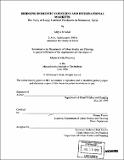Bridging domestic concerns and international markets : the story of large garment producers in Damascus, Syria
Author(s)
Sabah, Maysa N. (Maysa Nassir), 1972-
DownloadFull printable version (4.287Mb)
Other Contributors
Massachusetts Institute of Technology. Dept. of Urban Studies and Planning.
Advisor
Meenu Tewari.
Terms of use
Metadata
Show full item recordAbstract
For a country that was closed till 1990, and regarded as a textbook case of a closed economy, it is surprising to find in Syria a rapidly increasing number of large garment producers, that are supplying multinational buyers from Europe, and are rapidly transforming the country's garment sector. The aim of this study is to understand (i) why and how Syria is increasingly becoming a production base for several multinational buyers and intermediaries and (ii) why and how large Syrian producers are the chief conduits of this contact between Syria and European export markets and (iii) why and how knowledge is diffused from the large producers to other small and medium firms in the garment industry. Two main factors explain the rapid growth of in the number of firms producing for multinational buyers. First, the pruticular features of a core group of local firms that are attracting multinationai buyers: (i) long years of experience (ii) large-scale (iii) ability to produce a variety of products. The state played an important historical role in shaping these features by (i) indirectly creating an industrial class (ii) promoting cotton and infrastructure (iii) allowing for links between outside buyers and local producers after liberalization. Second, the nature of information transferred from multinational buyers and intermediaries to local producers, and which varied according to the type of agreement a firm was involved in. In tum, the targe producers are transferring the information acquired from European buyers to other local firms in the industry under two main conditions. First, producers manufacturing under franchising agreements generally tended to depend more on local producers for the supply of raw materials. Second, the existing Alawi-Sunni struggle existing within the Syrian society intensified the transfer of information from large producers to other local firms. Many of the Sunnis who own the large firms saw in transferring information to other smaller producers an opportunity to gain the support of the small producers and to revive their role as an industrial elite in the Syrian society.
Description
Thesis (M.C.P.)--Massachusetts Institute of Technology, Dept. of Urban Studies and Planning, 1999. Includes bibliographical references (p. 56-58).
Date issued
1999Department
Massachusetts Institute of Technology. Department of Urban Studies and PlanningPublisher
Massachusetts Institute of Technology
Keywords
Urban Studies and Planning.